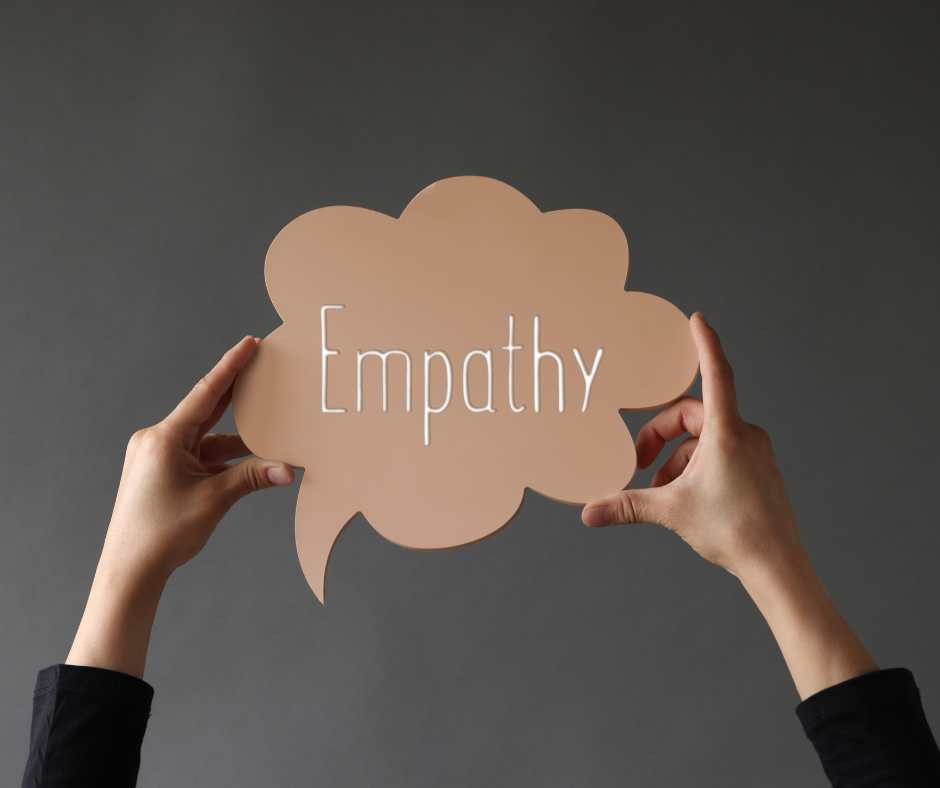Empathy is the ability to understand and share the feelings of others. It goes beyond sympathy, which is merely acknowledging and feeling sorry for someone’s emotions. Empathy involves putting yourself in someone else’s shoes and truly understanding their perspective and emotions.
Here at Character Builders, we have been reflecting on the year past and the year ahead and we have thought about the character strength of perspective and with that in mind, we felt we wanted to share the perspective of having empathy toward others.
More into the reflection, we thought about the teachers, the administration staff, and the students and how empathy plays a part in each and everyone’s lives.
Taking time to reflect on teachers, it is often surpassed the amazing jobs they do and the energy they provide to their classrooms. Teachers in particular face challenges daily and must find ways to overcome these challenges to ensure that the days runs smoothly not only for them, but for the students equally. The energy we as individuals bring daily to our home, workplaces, classrooms and even visiting the local coffee shop has a ripple/ flow on affect. In our Character Builders’ programs, one of our activities is Dominoes. It is an activity that acknowledges that we are all part of each other’s journey.
When we do things whether small activities or our jobs at hand, sometimes the acknowledgement of how well we do our jobs or how we show up for others may not be acknowledged or recognised. This can often make us feel deflated or to be left wondering if we have done a good enough job. This is whereas observing human beings, we can throw in that element of empathy towards others and displaying that character trait of perspective to ensure a positive response externally.
Empathy allows us to connect with those around us on a deeper level and show genuine care and support. It is a fundamental aspect of human interaction and plays a crucial role in building relationships, promoting understanding, and fostering compassion.
An example of having empathy is when you notice that a friend or work colleague is feeling down, and you take the time to listen to them and offer support. Instead of dismissing their feelings or trying to fix their problems, you offer a listening ear and validate their emotions. You let them know that you understand how they are feeling and that you are there for them. By showing empathy, you can connect with your friend on an emotional level and provide comfort and understanding. This small act will validate your friend or colleague and make then feel seen and heard and will enable them to be lifted by one act of empathy that you have provided.
Teaching empathy to students is an essential aspect of their emotional development. When students learn to understand and share the feelings of others, they become more compassionate and develop better social skills.
As adults, it is equally important that we continue to practice and display empathetic behaviour to serve as positive role models. As mentioned earlier, this is the ripple / flow on affect and can spread positively throughout peers, the classroom and in general anywhere empathy is displayed. The dominoes affect can be endless and is certainly and affective tool that can be used within the classroom or workplace.
Teaching Empathy to Students
Lead by example: Students learn best by observing the behaviour of adults around them. Display empathy in your daily interactions, such as actively listening, showing understanding, and being kind to others. Your actions will serve as a powerful model for students to follow.
Encourage perspective-taking: Help students understand different perspectives by discussing various viewpoints in different situations. Encourage them to imagine how others might feel in certain circumstances. This helps develop their ability to empathize and see things from different angles.
Promote emotional literacy: Teach students to recognize and label emotions, both in themselves and in others. This will enable them to better understand and empathize with the feelings of others. Use age-appropriate language and stories to help them identify and express their emotions.
Practice active listening: Teach students the importance of listening attentively when others are speaking. Encourage them to ask questions and show genuine interest in what others have to say. Active listening helps students develop empathy by truly understanding the thoughts and feelings of others.
Foster kindness and compassion: Encourage acts of kindness and compassion towards others. Teach children to share, help, and support those in need. Engage them in activities that promote empathy, such as volunteering or participating in community service projects.
Implementing Empathy in Daily Practice as Adults
Practice self-awareness: Start by becoming more aware of your own emotions, thoughts, and reactions. This self-perspective allows you to better understand your own feelings and empowers you to respond empathetically to others.
Listen actively: When engaging in conversations, make a conscious effort to listen actively. Give your full attention to the speaker, maintain eye contact, and show genuine interest. Reflect on what the person has said to ensure understanding and validate their feelings.
Be open-minded: Embrace different perspectives and be willing to consider alternative viewpoints. Recognize that everyone has their own unique experiences and feelings. Avoid jumping to conclusions or making assumptions about others.
Practice empathy in challenging situations: When faced with conflicts or difficult situations, try to put yourself in the other person’s shoes. Understand their emotions and motivations and respond with empathy rather than anger or judgment. This can help de-escalate conflicts and foster understanding.
Be kind and supportive: Show kindness and support to those around you. Offer a helping hand, lend an ear, or provide words of encouragement. Small acts of kindness can make a significant difference in someone’s day and create a positive ripple effect.
Remember, the empathy perspective is a skill that can be nurtured and developed over time. By practising empathy towards students and peers and by implementing empathetic behaviours in our daily lives, we contribute to creating a more compassionate and understanding society.
Character builders offers programs and resources to support character strengths and behaviours for students, teachers, and corporate workplaces. Reach out to the team at Character Builders today to chat more about how we can work together with any of our character-building programs at your school or company!
Phone us on 1300 205 101 or via email: info@characterbuilders.com.au



